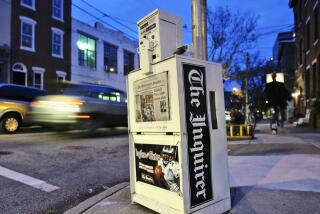High Court to Study Burden of Libel Proof : Will Hear Case of Philadelphia Paper in Beverage Firm’s Suit
- Share via
WASHINGTON — The Supreme Court agreed today to consider whether a newspaper bears the burden of proof in a libel suit brought by a private figure.
The court will hear arguments next term in a case brought by Philadelphia Newspapers Inc., which publishes the Philadelphia Inquirer. Operators of a beer and beverage company claimed the paper libeled them in articles alleging that the operators had links to organized crime.
Central in the case is the question of who bears the burden of proof in libel suits by private figures. Pennsylvania and other states put the burden of proof on the publishers, while some jurisdictions place the burden on the person bringing the suit.
In some areas there has been no legal decision either way.
Public Figures Different
In contrast, a person deemed to be a public figure, such as a politician or entertainer, has a much more difficult task in bringing a libel suit. Not only must the individual prove a publication false, but also that the false material was published with malice or the knowledge that it was false.
After a six-week trial and following jury instructions that it was the burden of the beverage distributors to prove the articles false, a jury on July 13, 1981, found in favor of the newspaper.
However, on appeal to the Pennsylvania Supreme Court, the decision was overturned based on a state law that set the burden of proof on the newspaper. The state high court ordered a new trial.
In appealing to the Supreme Court, the newspaper company argued that the state law allowed a libel ruling without any proof that the publication was false.
In other cases the court:
--Ruled that protesters may be prosecuted for demonstrating peacefully at public celebrations on military bases if the military previously barred them from entering the base.
In a 6-3 ruling, Justice Sandra Day O’Connor said for the court that the “important government interest in assuring the security of military installations” overrides the protesters’ First Amendment rights.
--In a case involving potentially millions of dollars in higher telephone bills, said it will decide whether the federal government may force states to raise rates for intrastate telephone service.
More to Read
Sign up for Essential California
The most important California stories and recommendations in your inbox every morning.
You may occasionally receive promotional content from the Los Angeles Times.













